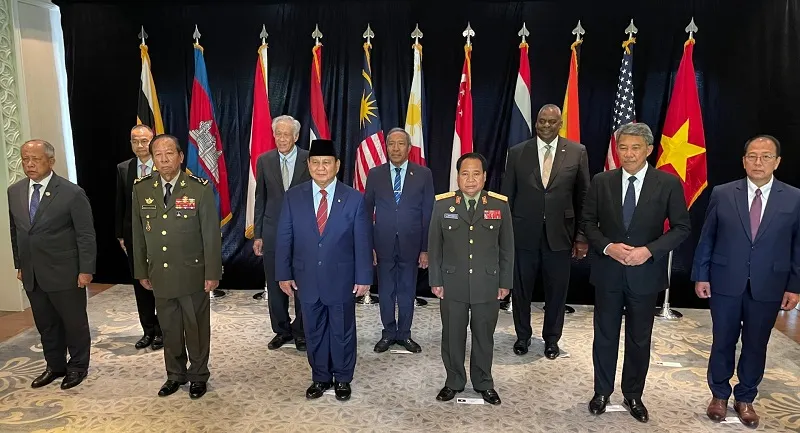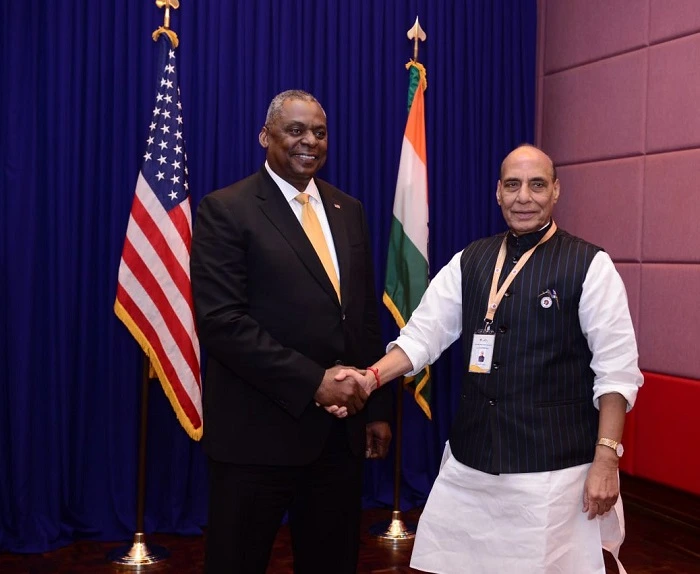

US Secretary of Defence Lloyd Austin at the informal meeting with Southeast Asia Defence Ministers and their representatives in Singapore on Friday (Image courtesy: Ministry of Defence, Singapore)
The United States on Friday said that it will continue its engagement with the Southeast Asian region to enhance defence cooperation amongst the countries, including through the ASEAN Defence Ministers’ Meeting (ADMM)-Plus.
The US Secretary of Defence Lloyd Austin reaffirmed Washington’s commitment during an informal Southeast Asia-US Defence Ministers’ meeting held on the sidelines of the 20th Shangri-La Dialogue (SLD) in Singapore.
Last November, it was on the margins of the Association of Southeast Asia Nations Defence Ministers Meeting-Plus (ADMM-Plus) in Cambodia’s Siem Reap that Austin held extensive talks with Defence Minister Rajnath Singh where China’s “increasing bellicosity” and the issue of Beijing intensifying its efforts to challenge the rules-based international order was discussed in detail.


Austin flew to Singapore from Tokyo earlier in the day where he promised to provide “extended deterrence” to Japan, optimise US force posture and build links with “like-minded partners” in order to tackle China’s growing Pacific presence and North Korea’s increased nuclear and missile activities.
Following the Singapore stopover, the US Secretary of Defence will arrive in New Delhi over the weekend – his second visit to India since assuming office.
During his meeting with the Defence Ministers of the region on Friday, Austin spoke about sustaining a rules-based regional security environment and the importance of ASEAN to the security and prosperity of the Indo-Pacific.
Singapore’s Minister for Defence Ng Eng Hen welcomed the US’ commitment to engage with ASEAN, and reaffirmed his country’s longstanding support for the US’ presence in the region.
“Dr Ng also looked forward to strengthening defence relations and enhancing cooperation with the US, including through the ADMM-Plus to tackle both international and regional security challenges,” said a statement from the Singapore Ministry of Defence.
Both top officials also held separate one-on-one meeting focusing on geopolitical developments in the Asia-Pacific region and enhancement of bilateral defence cooperation, particularly through the acquisition and operationalisation of Lockheed Martin F-35Bs by the Republic of Singapore Air Force (RSAF).
Singapore signed an agreement to purchase four F-35Bs in 2020 and announced earlier this year that it will add eight more Joint Strike Fighters to its fleet by the end of the decade.
Interestingly, Chinese State Councilor and Minister of National Defence General Li Shangfu is also in Singapore for the Shangri-La Dialogue and called on Acting Prime Minister Lawrence Wong Friday morning.
Washington revealed Thursday that the Chinese Defence Minister had declined Austin’s request for a meeting on the sidelines of the event in Singapore.
“The minister of defence declining to meet with me. I think that’s unfortunate. But we’re going to continue to do what we are doing in this region and others, and that is to work with like-minded countries who share common values and common goals to continue to promote a free and open Indo-Pacific,” said Austin while addressing media in Tokyo along with Japanese Minister of Defence Hamada Yasukazu.
Both countries have been involved in a war of words this week after the US Indo-Pacific Command on Tuesday accused a Chinese J-16 fighter pilot of performing an “unnecessarily aggressive manoeuvre” during the intercept of a US Air Force RC-135 aircraft in international airspace over the South China Sea.
“As we take a look at some of the things that China is doing in the international airspace in the region and the international waterways, you know, the provocative intercepts of our aircraft and also our allies’ aircraft, that’s very concerning, and we would hope that they would alter their actions,” Austin said in Tokyo.
As reported by IndiaNarrative.com, the US is going full steam ahead to deepen its major defence partnership with India which Washington believes has entered “a new and exciting” chapter.
In New Delhi, Austin is expected to take forward the India-US Initiative on Critical and Emerging Technology (iCET) to drive the co-development and co-production of major defence platforms besides deepening interoperability and coordination between the militaries of the two countries.
Israel Defence Forces Spokesperson Brigadier General Effie Defrin on Thursday said that Iran has expressed…
India's Hindustan Aeronautics Limited (HAL) and French engine manufacturer, Safran Aircraft Engines, signed an agreement…
India has emerged as a country with the third-largest growth in power generation capacity globally…
Prime Minister Narendra Modi hailed Indian chess grandmaster Divya Deshmukh for defeating world number one…
The family of detained Baloch leader Mahrang Baloch has accused prison authorities at Quetta's Hudda…
The QS World University 2026 Rankings bring great news for our education sector, as the…